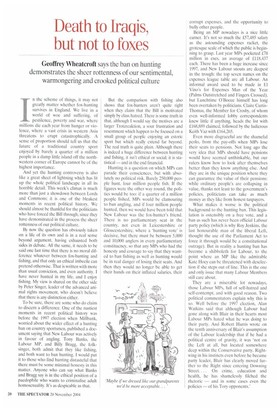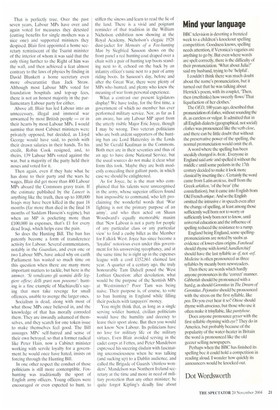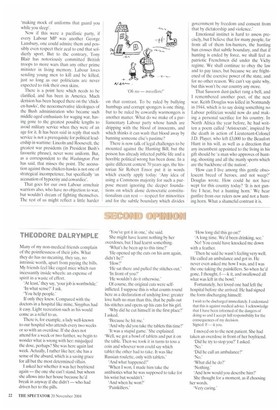Death to Iraqis, but not to foxes
Geoffrey Wheatcroft says the ban on hunting demonstrates the sheer rottenness of our sentimental, warmongering and crooked political culture In the scheme of things, it may not greatly matter whether fox-hunting survives in England. We live in a world of woe and suffering, of pestilence, poverty and war, where millions die each year from hunger or violence, where a vast crisis in western Asia threatens to erupt catastrophically. A sense of proportion should tell us that the future of a traditional country sport enjoyed by barely a quarter of a million people in a damp little island off the northwestern corner of Europe cannot be of the highest importance.
And yet the hunting controversy is also like a great sheet of lightning which has lit up the whole political landscape in all its horrible detail. This week's climax is much more than just a showdown between Lords and Commons; it is one of the bleakest moments in recent political history. We should almost be thankful for the politicians who have forced the Bill through, since they have demonstrated in the process the sheer rottenness of our political culture.
By now the question has obviously taken on a life of its own and is in a real sense beyond argument, having exhausted both sides in debate. All the same, it needs to be said one last time that there is no moral difference whatever between fox-hunting and fishing, and that only an ethical imbecile can pretend otherwise. That is written with more than usual conviction, and even authority. I have never hunted in my life, and I enjoy fishing. My view is shared on the other side by Peter Singer, leader of the advanced animal rights movement, who doesn't believe that there is any distinction either.
To be sure, there are some who do claim to discern a difference. One of the nastiest moments in recent political history was before the 1997 election when Millbank, worried about the wider effect of a hunting ban on country sportsmen, published a document saying that New Labour was actively in favour of angling. Tony Banks, the Labour MP, and Billy Bragg, the folksinger, both admit that they like fishing, and both want to ban hunting. I would put it to those who find hunting distasteful that there must be some minimal honesty in this matter. Anyone who can say what Banks and Bragg say is in the ethical position of a paedophile who wants to criminalise adult homosexuality. It's as despicable as that. But the comparison with fishing also shows that fox-hunters aren't quite right when they claim that the Bill is motivated simply by class hatred. There is some truth in that, although I would say the motives are a larger Trotzreaktion, a sour frustration and resentment which happen to be focused on a small group of people enjoying an estoric sport but which really extend far beyond. The real truth is quite plain. Although there is indeed a huge difference between hunting and fishing, it isn't ethical or social; it is statistical — and in the end financial.
Hunting is a question on which MPs can parade their consciences, but with absolutely no political risk. Barely 250,000 people hunt, four million people fish. If the figures were the other way round, the politics would be too: if a quarter of a million people fished, MPs would be clamouring to ban angling, and if four million people hunted, then we would have been told that New Labour was the fox-hunter's friend. There is no parliamentary seat in the country, not even in Leicestershire or Gloucestershire, where a 'hunting vote' is decisive, but there must be between 5,000 and 10,000 anglers in every parliamentary constituency, so that any MPs who had the honesty and courage to say that they wanted to ban fishing as well as hunting would be in real danger of losing their seats. And then they would no longer be able to get their hands on their inflated salaries, their
corrupt expenses, and the opportunity to bully other people.
Being an MP nowadays is a nice little earner. It's not so much the £57,485 salary as the astounding expenses racket, the grotesque scale of which the public is beginning to grasp. Last year MPs pocketed £78 million in exes, an average of £118,437 each. There has been a huge increase since 1997, and New Labour snouts are deepest in the trough: the top seven names on the expenses league table are all Labour. An informal award used to be made in El Vino's for Expenses Man of the Year (Palms Outstretched and Fingers Crossed), but Lunchtime O'Booze himself has long been overtaken by politicians. Claire CurtisThomas, the Member for Crosby, of whom even well-informed lobby correspondents knew little if anything, heads the list with £168,889 claimed, followed by the ludicrous Keith Vaz with £164,265.
Even more disgraceful are the shameful perks, from the pay-offs when MPs lose their seats to pensions. Not long ago the very idea that MPs should have pensions would have seemed unthinkable, but our rulers know how to look after themselves better than they know anything else. And they are in the unique position where they can guarantee the value of their pensions: while ordinary people's are collapsing in value, thanks not least to the government's policies, politicians can take as much money as they like from honest taxpayers.
What makes it worse is the political background to the hunting ban. This legislation is ostensibly on a free vote, and a ban as such has never been official Labour party policy (which is why Roy Jenkins, the last honourable man of the liberal Left, thought the use of the Parliament Act to force it through would be a constitutional outrage). But in reality a hunting ban has become a shibboleth for Labour, to the point where an MP like the admirable Kate Hoey can be threatened with deselection if she steps out of line. This is the one and only issue that many Labour Members still care about.
They are a miserable lot nowadays, those Labour MPs, full of self-hatred and self-contempt, and with good reason. Two political commentators explain why this is so. Well before the 1997 election, Alan Watkins said that although Labour had gone along with Blair in their hearts most Labour MPs hated what he was doing to their party. And Robert Harris wrote on the tenth anniversary of Blair's assumption of the Labour leadership that if he had a political centre of gravity, it was snot on the Left at all, but located somewhere deep within the Conservative party. Rightwing in his instincts even before he became party leader, Blair has clearly moved further to the Right since entering Downing Street.... On crime, education and health, he has shamelessly filched the rhetoric — and in some cases even the policies — of his Tory opponents.' That is perfectly true. Over the past seven years, Labour MPs have over and again voted for measures they detested (cutting benefits for single mothers was a nice one) and supported ministers they despised. Blair first appointed a home sec retary; reminiscent of the Tsarist minister of the interior of whom it was said that the only thing further to the Right of him was the wall, and then achieved a feat almost contrary to the laws of physics by finding in David Blunkett a home secretary even more obscurantist than Jack Straw. Although most Labour MPs voted for foundation hospitals and top-up fees, there is not an honest majority in the parliamentary Labour party for either.
Above all, Blair has led Labour into an unnecessary, illegal and immoral war unwanted by most British people — or in their hearts by most Labour MPs. I would surmise that most Cabinet ministers were privately opposed, but decided, as Lloyd George would have said, to perish with their drawn salaries in their hands. To his credit, Robin Cook resigned, and, to theirs, 139 Labour MPs voted against the war, but a majority of the party held their noses and voted for it.
Then again, even if they hate what he has done to their party and the wars he wages, Blair did get more than 400 Labour MPs aboard the Commons gravy train. If the estimate published by the Lancet is anything like the truth, then up to 100,000 Iraqis may have been killed in the past 18 months (far more than died in the final 18 months of Saddam Hussein's regime), but when an MP is pocketing more than £100,000 in expenses, that's £1 for every dead Iraqi, which helps ease the pain.
So does the Hunting Bill. The ban has patently become a form of transference activity for Labour. Several commentators, notably in the Guardian, and even one or two Labour MPs, have asked why on earth Parliament has wasted so much time on this question when there are many more important matters to tackle, but here is the
answer. 'Si vendicano gli uomini delle leggiere offese; delli gravi non possono': hunting is a fine example of Machiavelli's saying that men take revenge for small offences, unable to avenge the larger ones.
Socialism is dead, along with most of what those MPs once believed in, and the knowledge of that has morally corroded them. They are inwardly ashamed of themselves, and they search for one token issue to make themselves feel good. The Bill assuages MPs' self-hatred and sense of their own betrayal, so that a former radical like Peter Hain, now a Cabinet minister working with servile loyalty for a government he would once have hated, insists on forcing through the Hunting Bill.
In one other respect the conduct of those politicians is still more contemptible. Fox hunting was traditionally the sport of English army officers. Young officers were encouraged or even expected to hunt, to stiffen the sinews and learn to read the lie of the land. There is a vivid and poignant reminder of that tradition in the William Nicholson exhibition now showing at the Royal Academy. Nicholson's elegaic 1928 dust-jacket for Memoirs of a Fox-hunting Man by Siegfried Sassoon shows on the front panel a red hunting coat draped over a chair with a pair of hunting top boots standing next to it, echoed on the back by an infantry officer's tunic next to a pair of army riding boots. In Sassoon's day, before and after the Great War, there were plenty of MPs who hunted, and plenty who knew the meaning of war from personal experience.
What a contrast our present legislators display! We have today, for the first time, a government of which no member has ever performed military service. Nor, as far as I am aware, has any Labour MP apart from the utterly risible Major Eric Joyce, though I may be wrong. Two veteran politicians who are both ardent supporters of the hunting ban are Lord Hattersley in the Lords and Sir Gerald Kaufman in the Commons. Both men are in their seventies and thus of an age to have done National Service, but the usual sources do not make it clear what form this took. Maybe they are both modestly concealing their gallant pasts, in which case we should be enlightened.
As for Joyce, he is the man who complained that his talents were unrecognised in the army, whose superior officers found him impossible to command, who left proclaiming the wonderful words that 'War fighting is not the primary purpose of an army', and who then acted on Shaun Woodvvard's equally memorable maxim that 'New Labour is not a party for people of any particular class or any particular view' to find a cushy billet as the Member for Falkirk West. Joyce has since become a 'loyalist' notorious even under this government for his unswerving sycophancy, and at the same time he is right up in the expenses league with a cool £152,861 claimed last year. A quarter of a century ago, the truly honourable Tam Dalyell posed the West Lothian Question: after devolution, what would be the purpose of the Scottish MPs at Westminster? Poor Tam was being naive. Their purpose is, of course, to vote to ban hunting in England while filling their pockets with taxpayers' money.
You might think that, as long as a single serving soldier hunted, civilian politicians would have the humility and decency to leave their sport alone. But then you would not know New Labour. Its politicians have no love for military life or the military virtues. Even Blair avoided serving in the cadet corps at Fettes, and Peter Mandelson expressed his sneering disdain with fascinating unconsciousness when he was talking (and sucking up) to a Dublin audience, and called the Brigade of Guards 'chinless wonders'. Mandelson was Northern Ireland secretary at the time and more in need of military protection than any other minister; he quite forgot Kipling's deadly line about 'making mock of uniforms that guard you while you sleep'.
Now if this were a pacifistic party, if every Labour MP was another George Lansbury, one could admire them and possibly even respect their zeal to end that soldierly sport. But to the contrary, Tony Blair has notoriously committed British troops to more wars than any other prime minister in living memory. Labour loves sending young men to kill and be killed, just so long as our politicians are never expected to risk their own skins.
There is a point here which needs to be clarified, and has been in America. Much derision has been heaped there on the 'chicken-hawks', the neownservative ideologues of the Bush administration who became such middle-aged enthusiasts for waging war, having gone to the greatest possible lengths to avoid military service when they were of an age for it. It has been said in reply that such service is not a prerequisite for political leadership in wartime: Lincoln and Roosevelt, the greatest war presidents (in President Bush's favourite phrase), never wore uniform. But, as a correspondent to the Washington Post has said, that misses the point. The accusation against those chicken-hawks is not one of strategical incompetence, but specifically 'an accusation of hypocrisy and cowardice'.
That goes for our own Labour armchair warriors also, who have no objection to war, but wouldn't dream of fighting themselves. The rest of us might reflect a little harder on that contrast. To be ruled by bullying humbugs and corrupt spongers is one thing, but to be ruled by cowardly warmongers is another matter. What do we make of a parliamentary Labour party whose hands are dripping with the blood of innocents, and which thinks it can wash that blood away by banning someone else's pastime?
There is now talk of legal challenges to be mounted against the Hunting Bill, but the poison has already infected public life and a horrible political wrong has been done. In a quite different context 70 years ago, the historian Sir Robert Ensor put it in words which exactly apply today: 'Any idea of using a Commons majority for such a purpose meant ignoring the deeper foundations on which alone democratic constitutionalism can rest — respect for minorities and for the subtle boundary which divides
government by freedom and consent from that by dictatorship and violence.'
Emotional instinct is hard to assess precisely, but I believe that for many people, far from all of them fox-hunters, the hunting ban crosses that subtle boundary, and that if hunting is ended by force, we shall feel as patriotic Frenchmen did under the Vichy regime. We shall continue to obey the law and to pay taxes, but because we are frightened of the coercive power of the state, and for no other reason. We can't say quite why, but this won't be our country any more.
That Sassoon dust-jacket rang a bell, and I remembered another poet, of the next war. Keith Douglas was killed in Normandy in 1944, which is to say doing something no Labour politician would now do and making a personal sacrifice for his country. In North Africa the year before, he had written a poem called 'Aristocrats', inspired by the death in action of Lieutenant-Colonel J.D. Player, who left £3,000 to the Beaufort Hunt in his will, as well as a direction that any incumbent appointed to the living in his gift should be 'a man who approves of hunting, shooting and all the manly sports which are the backbone of the nation'.
'How can I live among this gentle obsolescent breed of heroes, and not weep?' Douglas wrote. How could he not have wept for this country today? 'It is not gunfire I hear, but a hunting horn.' We hear gunfire from our rulers now and not a hunting horn. What a shameful contrast it is.




























































































 Previous page
Previous page